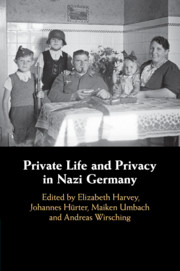Book contents
- Private Life and Privacy in Nazi Germany
- Private Life and Privacy in Nazi Germany
- Copyright page
- Contents
- Figures
- Notes on Contributors
- Acknowledgements
- Abbreviations
- I Interpreting the Private under National Socialism
- 1 Introduction
- 2 A Particular Kind of Privacy
- 3 Private Lives, Public Faces
- 4 Private and Public Moral Sentiments in Nazi Germany
- 5 (Re-)Inventing the Private under National Socialism
- II The Private in the Volksgemeinschaft
- III The Private at War
- Bibliography
- Index
5 - (Re-)Inventing the Private under National Socialism
from I - Interpreting the Private under National Socialism
Published online by Cambridge University Press: 28 June 2019
- Private Life and Privacy in Nazi Germany
- Private Life and Privacy in Nazi Germany
- Copyright page
- Contents
- Figures
- Notes on Contributors
- Acknowledgements
- Abbreviations
- I Interpreting the Private under National Socialism
- 1 Introduction
- 2 A Particular Kind of Privacy
- 3 Private Lives, Public Faces
- 4 Private and Public Moral Sentiments in Nazi Germany
- 5 (Re-)Inventing the Private under National Socialism
- II The Private in the Volksgemeinschaft
- III The Private at War
- Bibliography
- Index
Summary
This chapter analyses a range of different ego-documents, written and visual, to explore how ordinary Germans positioned themselves vis-a-vis the National Socialist regime. Creating such records was a symbolically charged practice which valorised notions of the private. The analysis particularly focuses on the performance of gender roles in this context. The first section explores these issues in private conversations recorded in the 1930s by Amy Buller, which were later published as 'Darkness over Germany'. The second section examines private photo albums made by young women, showcasing leisure and enjoyment as ways of living out ideological promises of the Nazi regime. The third section analyses an illustrated diary by the wife of a German officer, which configures her experience of the years 1942–1945 as a romantic fantasy. The analysis shows not just what National Socialism did to ordinary Germans, but what ordinary Germans did with National Socialism. In using it as a resource to realise their personal aspirations and fantasies, they could become avid supporters of the regime – but also ones that were all too happy to drop its specific political aims in an instance, when new ideological templates promised greater personal satisfaction.
Keywords
- Type
- Chapter
- Information
- Private Life and Privacy in Nazi Germany , pp. 102 - 132Publisher: Cambridge University PressPrint publication year: 2019

